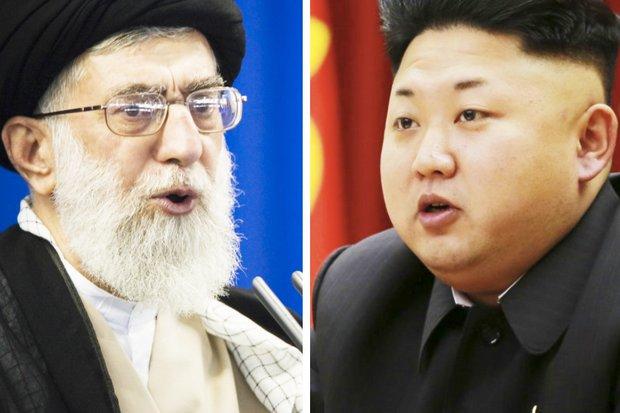IN THE MEDIA
After N Korea, don’t forget Iran
May 10, 2017 | Shmuel Levin

Shmuel Levin
Bangkok Post – 8 May 2017
As tensions continue to boil over North Korea’s nuclear programme, one refrain keeps repeating itself — namely, that we, the international community, have left this far too late.
Of course, the international community has tried to restrain North Korea’s nuclear program for years. Almost 25 years ago, in October 1994, North Korea first signed the “Agreed Framework” with the United States.
At the time, the then-US President Bill Clinton described the agreement as one that “will make the United States, the Korean Peninsula, and the world safer”.
Yet, within a decade, it became clear that the agreement had failed and that North Korea was still enriching uranium for its nuclear program.
Then, for more than 5 years, between 2003-2008, the US, Russia, China, South Korea, and Japan all tried unsuccessfully to negotiate a disarmament deal. These negotiations failed, and, all the while, North Korea carried on with its nuclear program.
More recently, the Obama Administration adopted a policy of “strategic patience”. During this time, the world sat and waited for North Korea to come back to the table while the United States embarked upon a secret program of cyber and electronic attacks against North Korea.
But upon inheriting office, US President Donald Trump was informed by the outgoing President Barack Obama that North Korea’s nuclear and missile threat was now likely to be the number one security challenge facing the new administration. And this, after almost 25 years of talks, deals, and negotiations.
If there is one takeaway then, it is that when rogue regimes seek to develop their nuclear capabilities, short-term deals and negotiations cannot be divorced from their long-term ambitions.
More recently, the Obama Administration signed another nuclear deal in 2015 with another rogue regime, Iran. This deal, too, was hailed as a non-proliferation success by the administration.
But this deal is set to expire in nine to 14 years, and the lifting of sanctions will see Iran emerge stronger than before the deal was signed. Given North Korea’s record, the question must be asked: What are Iran’s long-term ambitions beyond the short-term deal?
In this regard, US Secretary of State Rex Tillerson has stated that “Iran remains a leading state sponsor of terror through many platforms and methods”.
Iran is not only legally designated a state sponsor of terrorism by the United States, but has been responsible for multiple terrorist attacks throughout the world.
By contrast, even North Korea has not carried out any known sponsored acts of terrorism since the bombing of a Korean Airlines flight in 1987. (A possible exception is the recent assassination of Kim Jong-nam, but it is unclear whether this should be classified as a terrorist attack.)
Here it should be noted that Iran’s destabilising activities are not limited to the Middle East. In 2012, a series of explosions occurred in Bangkok which injured 5 people, after an Iranian bombing attempt backfired.
Elsewhere in the region, the Philippines authorities arrested active Hezbollah operatives, who had trained in Iran and Lebanon, together with Malaysian recruits. According to the Philippines authorities, Hezbollah operatives have been active throughout Southeast Asia, including in Thailand, the Philippines, Singapore, Malaysia, Australia, and even Myanmar.
In addition, Iran also seeks to become a Mideast regional hegemon. In this regard, Iranian officials boast of controlling four capitals outside their borders: Damascus, Baghdad, Beirut, and Sana’a.
Crucially, Iran is also actively seeking to dominate the Persian Gulf. This strategic location accounts for a majority of the world’s oil reserves, and approximately a third of all petroleum traded by sea travels through the Gulf.
Meanwhile, in Syria, Iran’s Revolutionary Guard Corps are fighting to preserve the Assad regime, which has used chemical weapons multiple times against its own people, including large-scale Sarin gas attacks. And, in Lebanon, Iran funds Hezbollah forces that have been designated a terrorist organisation by not only Western powers like the European Union, but also by the Gulf Cooperation Council.
It should also be noted that Iran and North Korea’s nuclear activities are interlinked. According to Israeli intelligence officials, Iranian scientists have been present at almost all of North Korea’s nuclear tests, and have received briefings on related topics.
While the nuclear deal places limits on Iran’s activities within its own borders, it allows far more freedom for activities elsewhere. As such, North Korea provides Iran with an ideal location to continue its activities. In addition, Iran has continued to test ballistic missiles since signing the nuclear deal. Whilst Iran may not be in technical violation of the deal, its activities show where its ambitions lie.
Like Iran, North Korea was once a signatory of the Nuclear Non-Proliferation Treaty. But, in 2003, North Korea withdrew from the Treaty with a growing nuclear program. Following this, many scholars questioned the effectiveness of multilateral institutions in ensuring nuclear non-proliferation. If Iran is to follow a similar path, this will put yet another nail in the coffin of the Non-Proliferation Treaty’s effectiveness.
As North Korea once again comes to the fore of the world’s conscious, the lesson should be clear. What matters is not short-term talk, deal, and negotiations, but whether Iran’s long-term ambitions have changed.
For now, this does not seem to be the case. And, if this is allowed to fester, the long-term result may be another North Korea, if not something even worse.
Shmuel Levin is a policy analyst with the Australia/Israel & Jewish Affairs Council in Melbourne, Australia.





